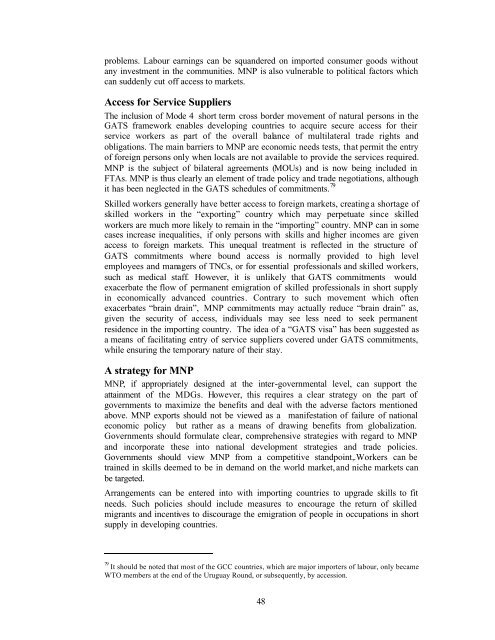Trade Policy Note Final-rev08 - Development
Trade Policy Note Final-rev08 - Development
Trade Policy Note Final-rev08 - Development
You also want an ePaper? Increase the reach of your titles
YUMPU automatically turns print PDFs into web optimized ePapers that Google loves.
problems. Labour earnings can be squandered on imported consumer goods without<br />
any investment in the communities. MNP is also vulnerable to political factors which<br />
can suddenly cut off access to markets.<br />
Access for Service Suppliers<br />
The inclusion of Mode 4 short term cross border movement of natural persons in the<br />
GATS framework enables developing countries to acquire secure access for their<br />
service workers as part of the overall balance of multilateral trade rights and<br />
obligations. The main barriers to MNP are economic needs tests, that permit the entry<br />
of foreign persons only when locals are not available to provide the services required.<br />
MNP is the subject of bilateral agreements (MOUs) and is now being included in<br />
FTAs. MNP is thus clearly an element of trade policy and trade negotiations, although<br />
it has been neglected in the GATS schedules of commitments. 79<br />
Skilled workers generally have better access to foreign markets, creating a shortage of<br />
skilled workers in the “exporting” country which may perpetuate since skilled<br />
workers are much more likely to remain in the “importing” country. MNP can in some<br />
cases increase inequalities, if only persons with skills and higher incomes are given<br />
access to foreign markets. This unequal treatment is reflected in the structure of<br />
GATS commitments where bound access is normally provided to high level<br />
employees and managers of TNCs, or for essential professionals and skilled workers,<br />
such as medical staff. However, it is unlikely that GATS commitments would<br />
exacerbate the flow of permanent emigration of skilled professionals in short supply<br />
in economically advanced countries. Contrary to such movement which often<br />
exacerbates “brain drain”, MNP commitments may actually reduce “brain drain” as,<br />
given the security of access, individuals may see less need to seek permanent<br />
residence in the importing country. The idea of a “GATS visa” has been suggested as<br />
a means of facilitating entry of service suppliers covered under GATS commitments,<br />
while ensuring the temporary nature of their stay.<br />
A strategy for MNP<br />
MNP, if appropriately designed at the inter-governmental level, can support the<br />
attainment of the MDGs. However, this requires a clear strategy on the part of<br />
governments to maximize the benefits and deal with the adverse factors mentioned<br />
above. MNP exports should not be viewed as a manifestation of failure of national<br />
economic policy but rather as a means of drawing benefits from globalization.<br />
Governments should formulate clear, comprehensive strategies with regard to MNP<br />
and incorporate these into national development strategies and trade policies.<br />
Governments should view MNP from a competitive standpoint,.Workers can be<br />
trained in skills deemed to be in demand on the world market, and niche markets can<br />
be targeted.<br />
Arrangements can be entered into with importing countries to upgrade skills to fit<br />
needs. Such policies should include measures to encourage the return of skilled<br />
migrants and incentives to discourage the emigration of people in occupations in short<br />
supply in developing countries.<br />
79 It should be noted that most of the GCC countries, which are major importers of labour, only became<br />
WTO members at the end of the Uruguay Round, or subsequently, by accession.<br />
48
















